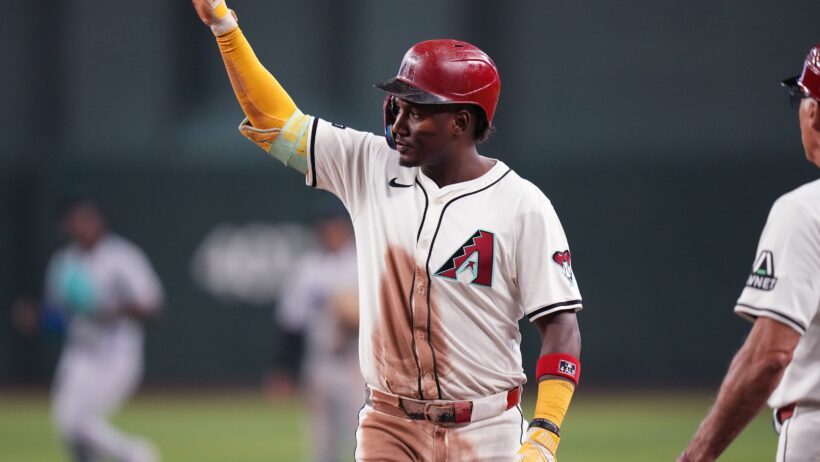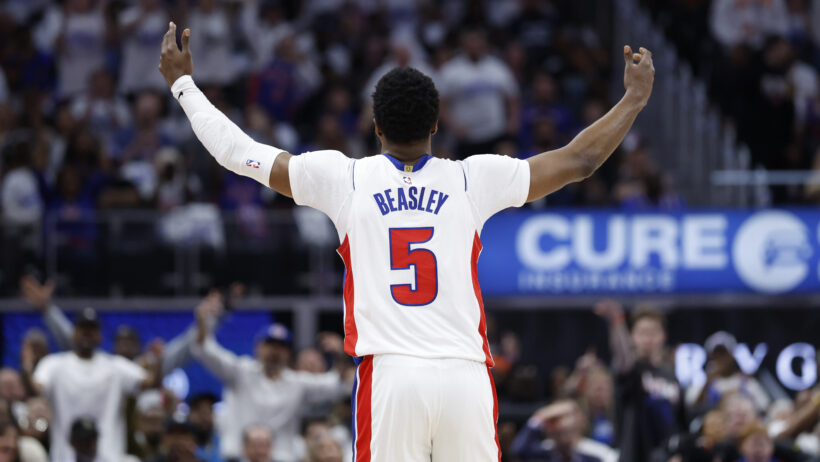What Is the Gambler’s Fallacy and How Do I Avoid It?

The gambler’s fallacy has existed for just as long as casinos and sportsbooks have – thousands of years. It is so immortalized in gambling and betting lore that it serves as a central plot point in one of the famous books of all time, Fyodor Dostoevsky’s The Gambler.
Also known as “The Monte Carlo Fallacy,” this is something that every sports bettor should be aware of. As part of our betting psychology guide, we walk you through the gambler’s fallacy, why so many people fall victim to it, and how to avoid it.
What Is the Gambler’s Fallacy?
In simple terms, it’s is when a bettor expects a reversal in luck after a prolonged run of one outcome. This means that, after a series of wins, they come to expect a loss (or vice versa)
The most straightforward example of the gambler’s fallacy can be illustrated with a coin toss. If you flip a coin three times (and each outcome is heads), the gambler’s fallacy would be the expectation that, on the fourth flip, the result would be tails. This line of thinking is incorrect, and an example of cognitive bias.
In most cases, the gambler’s fallacy occurs when people believe an event to be random, like whether a roulette ball falls on back or red. However, it absolutely does have application in our sports bets.
The gambler’s fallacy was made famous in psychology during the 1970s and was a substantial body of work Amos Tversky and Daniel Kahneman were doing in the area of cognitive biases. Tversky and Kahneman, a psychologist and behavioral economist respectively, pioneered a whole field of study on what causes people to make irrational decisions.
Gambler’s Fallacy vs. “Hot Hand Phenomenon”
The gambler’s fallacy and the hot hand phenomenon are closely-linked but slightly different. The hot hand fallacy refers to when we believe a series of successful events (i.e. free throw shots) will continue, solely because a string of success has just occurred (i.e. because we sunk our 3rd free throw in a row, we’re more likely to sink our 4th)
The gambler’s fallacy applies to when we expect a reversal of outcomes, not for a certain outcome to continue.
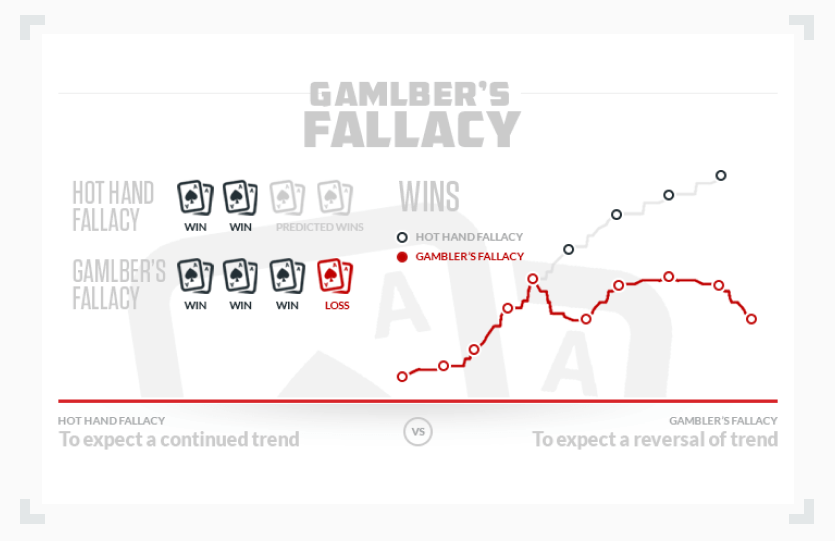
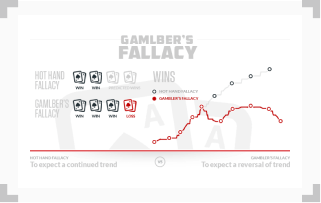
One Night in a Monte Carlo Casino
The gambler’s fallacy is sometimes referred to as “The Monte Carlo Fallacy”. This nickname was borne out of a particularly crazy night at a Monte Carlo Casino in 1913.
On this particular late summer night, the roulette ball fell into the black 26 times in a row. The probability of this happening is a staggering 1 in 136.8 million. Not even the most seasoned gamblers had ever seen a roulette wheel favor one outcome so heavily.
This Monte Carlo casino raked in millions and millions of Francs that night, thanks to the gambler’s fallacy. In fact, it was one of the most profitable nights of all time for any casino, as bettors got taken to cleaners by betting on a reversal of outcome.
These bettors were wrongly confident that the ‘randomness’ of the wheel had to return. Of course, those who bet before the ball finally landed on red on the 27th spin suffered massive losses.
Why Do We Fall for the Gambler’s Fallacy?
Like most cognitive biases, the gambler’s fallacy is a product of the natural human tendency to see patterns in random sequences of events.
The reason we fall for the gambler’s fallacy is that naturally, we want to believe that random numbers of a small sample will eventually balance out, just like they do over a large sample. Technically, this is called the “small numbers heuristic.”
Proving the Fallacy with Statistics
At first blush, a lot of people think that the gambler’s fallacy isn’t really a fallacy. After all, the probability of doing something like landing a red in the roulette wheel five times in a row is low, right? Wrong! Statistical analysis has conclusively proven that you shouldn’t follow this logic.
For the specific formulas and mathematical breakdowns, check out this comprehensive guide. For now, we’ll give you the simplified Cole’s notes version below.
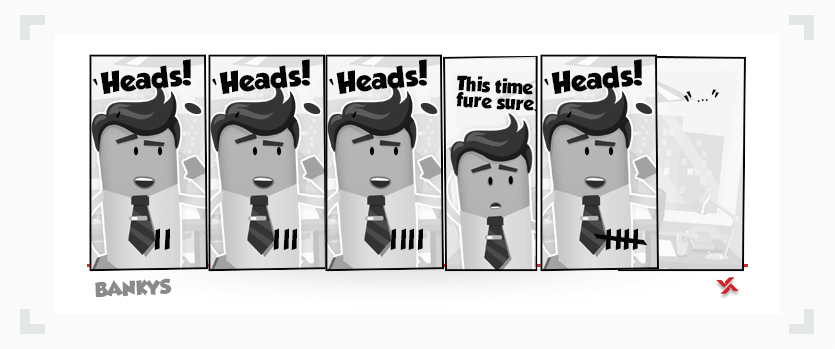

Over an extended period of time – and we’re talking billions of times – flipping a coin will produce something extremely close to an even distribution of heads and tails. The more and more you flip a coin, the closer you get to a 50/50 split of heads and tails. This is called the Law of Large Numbers.
When you’re dealing with, say, 10, 20, or even 50 flips, the Law of Small Numbers applies, dictating that a series of seemingly-low probability coin flips aren’t nearly as improbable as we might think.
The probability of landing six heads in a row is 1/64 (1/2 to the power of 6). Now, these odds are by no means excellent. 1/64 translates to roughly a 1.6% chance of flipping heads six consecutive times.
Someone suffering from the gambler’s fallacy would probably look at these bad odds after the 5th flip and assume that there’s a 98.4% chance the sixth flip will result in tails. In short, they expect a reversal of outcomes. This is absolutely wrong!
Once the first five flips are heads, the probability of this sequence of events occurring is 100%. It just happened! The sixth flip is wholly unrelated to the previous flip, and the probability of it being heads is still 50%.
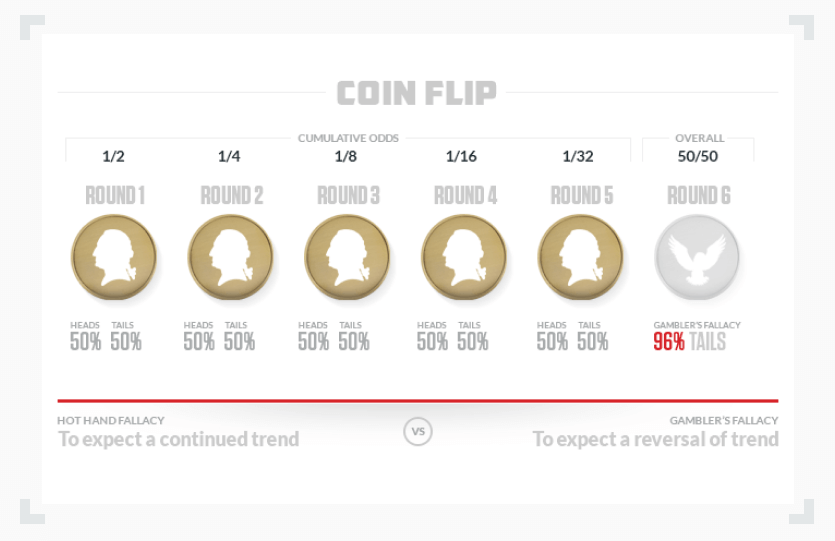
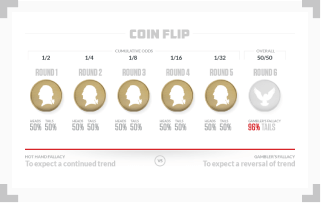
Real Life Examples of the Gambler’s Fallacy
It goes without saying that the most common application of the gambler’s fallacy is in gambling and betting. However, this fallacy can apply to many different situations.
A common example is when couples expect the gender outcome for their child. You might have heard a couple say something all the lines of “well, now that we’ve had three girls, the chance of us having a boy is higher!” Of course, this isn’t true. The likelihood of a couple having a boy after having three girls is still just 50/50, no matter the gender of their previous children.
Another oft-repeated example of the gambler’s fallacy is when people talk about air travel. They might think that because they’re frequent flyers, they’re due for a crash at some point. This isn’t true, as each flight is entirely independent of the last flight. If you live in the United States, each time you step on an airplane, your chances of getting in a crash are about one in 1.2 million. In fact, you are statistically least likely to die on a plane than at just about any other point in your life.
How this Fallacy Applies to Sports Betting
While the gambler’s fallacy applies more to events of random chance, it can definitely apply to sports betting. To get started, it’s good to refamiliarize yourself with implied probability.


Based on what we know about implied probability, sportsbooks have decided that the likelihood of either team winning is about 50%. The game is a toss-up. Seeing both teams on either side of a line listed at –110 is common when betting on the spread, betting on the over/under, and betting on the moneyline (like in our example).
If you get on a run of successful betting on -110, you might think that your luck just has to change, and you’re bound to lose. Similarly, if you’re on a huge losing streak, you might feel that your luck is bound to change, and you’re due for a win.
As you well know by now, this is absolutely false. Being on a successful or unsuccessful run doesn’t mean anything, other than the strength or weakness of your betting strategy.
You should never base a sports bet on the notion that your luck is bound to change. Doing so would be based on a flawed understanding of the laws of probability.
Your betting strategy is what will help you win sports bets. Not a reversal of luck.
Helpful Tips for Combatting the Gambler’s Fallacy
Thankfully, there are many different ways to overcome the gambler’s fallacy. In fact, it’s one of the easiest cognitive biases to correct when you’re placing sports bets.
As we get older, we are progressively less prone to the gambler’s fallacy. It’s one benefit of getting older, at least.
Psychologists Christopher Roney and Lana Trick published a study confirming that merely teaching individuals about randomness can make them less prone to the gambler’s fallacy.
Training people to treat each event as a beginning and not a continuation helps them avoid falling into this trap.
Check out of series on betting psychology for more information on how to become a sharper sports bettor.

Evergreen Manager; Sportsbook Expert
Following a sports journalism career with his work appearing in outlets like theScore, The Province, and VICE Sports, Patrick moved into the world of content marketing to bridge the gap between great writing and SEO success. He’s brought that same mindset to lead evergreen content efforts at SBD.

